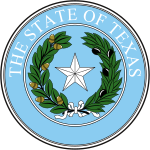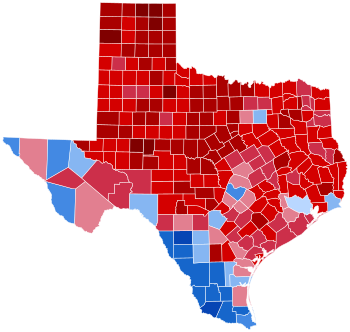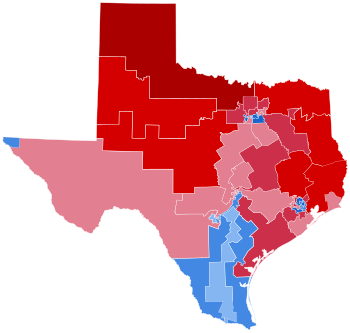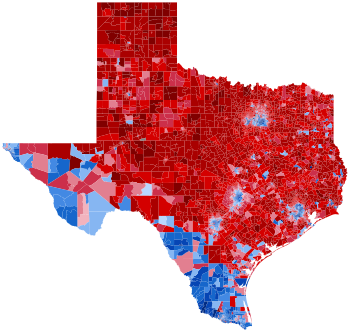| ||||||||||||||||||||||||||
| Turnout | 58.6% (of registered voters) 43.7% (of voting age population)[1] | |||||||||||||||||||||||||
|---|---|---|---|---|---|---|---|---|---|---|---|---|---|---|---|---|---|---|---|---|---|---|---|---|---|---|
| ||||||||||||||||||||||||||
| ||||||||||||||||||||||||||
| ||||||||||||||||||||||||||
| Elections in Texas |
|---|
 |
|
|
The 2012 United States presidential election in Texas took place on November 6, 2012, as part of the 2012 United States presidential election in which all 50 states plus the District of Columbia participated. Texas voters chose 38 electors to represent them in the Electoral College via a popular vote pitting incumbent Democratic President Barack Obama and his running mate, Vice President Joe Biden, against Republican challenger and former Massachusetts Governor Mitt Romney and his running mate, Congressman Paul Ryan.
As the largest Republican stronghold in the country, Romney won Texas with 57.17%, over Obama's 41.38%, a margin of 15.79%. As in past elections, Obama and the Democrats dominated the Rio Grande Valley, winning upwards of 70% or 80% of the vote in most of these counties, with his best performance in Starr County at 86.34% to Romney's 13.02%, a 73.32% margin. Furthermore, he won the major urban centers of Austin, El Paso, Dallas, Houston, and San Antonio, but Republicans were able to overwhelm the urban vote by sweeping the vast rural areas and suburbs of Texas by large margins. Romney also came extremely close to carrying Harris County, home to Houston, which Obama carried by only 0.08%, or 971 votes.[2] In the process, Romney beat George W. Bush's 2004 record of the most votes for a presidential candidate in Texas, a record later surpassed in 2016 by Donald Trump and in 2020 by both Trump and Joe Biden. By receiving 95.86% of the vote in King County,[3] Romney also recorded the highest proportion of any county's vote cast for one candidate since Barry Goldwater received between 95.92 and 96.59% of the vote in seven Mississippi counties[a] in Mississippi in 1964 – although this occurred when African-American majorities in these counties had been almost totally disenfranchised for seven and a half decades.
Texas's 38 electoral votes were Romney's largest electoral prize in the election. The state solidified its Republican identity in the Reagan Era and had not voted for a Democratic presidential nominee since fellow Southerner Jimmy Carter carried it in 1976. The oil industry is the driving factor of the state's economy, with numerous oil companies such as ExxonMobil being based in the state,[4] and consequently the state has rejected the Democratic Party which has increasingly embraced environmentalist policies. In addition, moderate Republicans' popularity among suburban Texans boosted their support. However, although Romney improved on John McCain's 2008 performance, this election solidified the Texan urban areas' move away from the GOP. Dallas and Harris Counties, home to Dallas and Houston, respectively, both of which flipped in 2008, remained blue this year, setting the stage for suburban areas beginning to slip from the Republican Party.
- ^ "Turnout and Voter Registration Figures (1970-current)".
- ^ "Texas". The New York Times. ISSN 0362-4331. Retrieved December 2, 2020.
- ^ See Dave Leip's Atlas of U.S. Presidential Elections; 2012 Presidential Election Statistics (and earlier years)
- ^ "Fortune 500 2011: States: Texas Companies - FORTUNE on CNNMoney.com". money.cnn.com. Retrieved December 2, 2020.
Cite error: There are <ref group=lower-alpha> tags or {{efn}} templates on this page, but the references will not show without a {{reflist|group=lower-alpha}} template or {{notelist}} template (see the help page).




